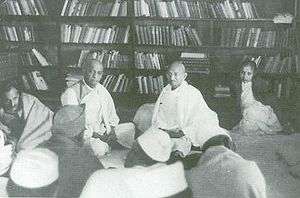Swaraj Bhavan
Coordinates: 25°27′36″N 81°51′38″E / 25.460097°N 81.860599°E

Swaraj Bhavan (formerly Anand Bhavan, meaning Adobe of Bliss)[1] is a large mansion located in Allahabad, India. It was owned by Indian political leader Motilal Nehru in the 19th century, it has served as the ancestral home of the Nehru Family— future Prime Minister of India Indira Gandhi was born there. The First Prime Minister of India Jawaharlal Nehru was however not born in Anand Bhawan.[2]
It is managed by the 'Jawaharlal Nehru Memorial Fund', Delhi.
History
In 1900, Motilal Nehru, a prominent lawyer, bought a palatial residence at 1 Church Road, Allahabad, for a sum of 19,000 Rupees. The house was in complete disrepair, but the estate was huge. Extensive renovation work was carried out over the next decade. Motilal used his frequent visits to Europe to buy the choicest furniture and china. He turned the mansion into a veritable palace, ‘an elaborate replica of an English country estate … bifurcated between East and West’, with a retinue of almost a hundred people in the house. Motilal called the house Anand Bhavan (lit. Abode of happiness).
Swaraj Bhawan originally belonged to Sir Syed Ahmad Khan, the 19th century Muslim leader and educationist. At the house-warming party, Sir William Moor hoped that this large palatial home in Civil Lines of Allahabad would become the cement holding together the British Empire in India. Paradoxically, the house was bought by Motilal Nehru in 1900, and went on to become a cradle to the Indian Freedom Struggle which was to destroy British rule in India.[3]
Motilal Nehru was a prominent member of the Indian National Congress Party. Due to this, lot of noted leaders and party activists would visit the “Nehru House”. Following the rise of Motilal's son, Jawaharlal Nehru, the mansion virtually became the center of the Indian independence movement. It was informally the headquarters of the All India Congress Committee in the 1920s before it was donated by Motilal Nehru to the Indian National Congress in 1930, to serve as the party's official headquarters in the region. The Nehrus built another house next to the old one and named that Anand Bhavan; the old house was renamed Swaraj Bhavan (lit. Abode of freedom). Some sources claim that the name Anand Bhawan was coined by the poet Akbar Allahabadi [ translation of Sir Syed's house 'Ishrat Manzil' ] (Luxurious Abode?)
Indira Gandhi, India’s then Prime Minister, donated Anand Bhavan to the nation in 1970 and turned it into a museum housing the books and memorabilia of her father and grandfather. Today it is one of the country’s best-run museums. Its pillared verandahs and high-ceilinged rooms have witnessed many trysts with destiny; some are known and documented by historians of modern India, others known only to its inmates who are no more.
Now, the Swaraj Bhavan premise conducts classes to teach arts and crafts to children.
A light and sound programme is also organized here. There are four shows every day.
See also
References
- ↑ Brendon, Piers (July 6, 2010). The Decline And Fall Of The British Empire. Random House. Retrieved March 21, 2014.
- ↑ http://www.highbeam.com/doc/1P3-979254251.html
- ↑ "The Little Magazine - Ghosts - David Lelyveld - The mystery mansion". www.littlemag.com. Retrieved 2016-04-08.